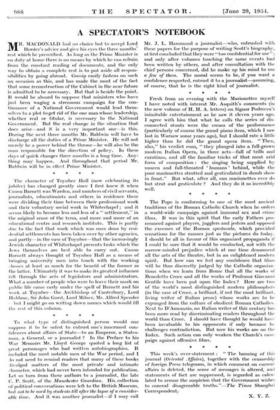To what type of distinguished person would one suppose it
to be safest to entrust one's innermost con- fidences about affairs of State—to an Emperor, a States- man, a General, or a journalist ? In the Preface to his War Memoirs Mr. Lloyd George quoted a long list of great personages who had written autobiographies. It included the most notable men of the War period, and I :lo not need to remind readers that many of these books :livulged matters of the most private and intimate character, which had never been intended for publication. Let us turn from these authors to a journalist, the late C. P. Scott, of the Manchester Guardian. His, collection of political conversations were left to the British Museum, but not to be used by students till after the lapse of a consider- able time. And it was another journalist—if. I may call Mr. J. L. Hammond a journalist—who, entrusted with these papers for the purpose of writing Scott's biography, at first concluded that they were " too confidential for use ; and only 'after volumes touching the same, events, had been written by others, and after consultation with the chief persons concerned, did he make up his mind to use a few of them. The moral seems. to be, if you want a confidence respected, entrust it to a journalist—assuming, of course, that he is the right kind of journalist.. • * * *




































 Previous page
Previous page